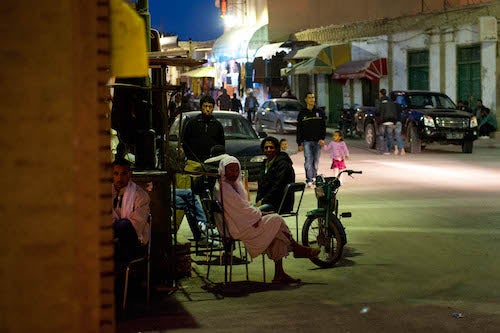 Une economie sociale et solidaire peut promouvoir l’inclusion sociale en Tunisie.
Une economie sociale et solidaire peut promouvoir l’inclusion sociale en Tunisie.
In recent decades, Tunisia has experienced strong economic and social progress and, more recently, a successful democratic transition through the Arab Spring. The convergence between social progress and economic development has however slowed down due to low levels of investment as well as the persistence of social and regional inequalities.
According to OECD’s Economic Survey of Tunisia of March 2018, the proportion of external and public debt to Tunisia’s GDP has sharply risen since 2011. In order to put Tunisia back on a sustainable trajectory, without slowing down economic growth and the implementation of structural reforms, public spending needs to be redirected to the benefit of disadvantaged populations in the context of inclusive growth.
Thus, the establishment of a social and solidarity economy (SSE) is essential to create economic opportunities for the benefit of vulnerable populations.
The International Labor Organization presents the social and solidarity economy as a notion where the goal of companies and organizations -- their cooperatives, mutual, associations, foundations, and social enterprises -- is to produce goods, services and knowledge while pursuing both economic and social objectives and the promotion of solidarity. Accordingly, in the social and solidarity economy, economic activity and social equity are harmonized through social innovations to fight exclusion and ensure equal opportunities.
In recent years, the social and solidarity economy has become one of the most important tools for economic development and social stability in many developing and developed economies of the world due to its contributions to GDP growth as well as wealth and job creation.
How to establish a social and solidarity economy in Tunisia?
I believe, the answer is simple: The government needs to enact laws to foster economic decentralization and ensure a better social and economic participation of certain groups and individuals who face barriers in accessing the labor market as well as goods and services produced by the traditional economy. Such laws need to have increased benefits to vulnerable groups in Tunisia such as women, young people, handicapped, migrants, and indigenous communities.
Thus, SSE has the potential to promote social inclusion, especially for the most vulnerable, by providing sustainable access to the labor market. As we know, exclusion from the labor market, education, health services, and housing exposes people to extreme poverty, low quality of life, low self-esteem and loss of human dignity. Therefore, active participation of vulnerable people in social economic organizations (as employees, but ideally as entrepreneurs) represents a major step towards fighting social exclusion and the achievement of a decent standard of living.
The promulgation of such laws will, however, not suffice. The government will also have to quickly adopt a national approach based on targeted programs to support the socio-economic integration of vulnerable groups and the national approach will also have to be augmented with specific public policies for territorial development. Tax incentives need to be created to encourage private actors to invest in the social and solidarity economy. Furthermore, the government should create the necessary institutional framework, establish administrative facilities (for obtaining licenses and opening bank accounts) and provide more support for the microfinance system. These measures will attract actors in the informal economy to the formal one and enable them to implement small or medium projects in an organized manner. In order to attract as many citizens as possible, proper training and learning mechanisms also need to be ensured.
Finally, to promote territorial development, authorities must launch initiatives to facilitate the creation and growth of social and solidarity-based enterprises. These companies are often the only option for marginalized communities as private investors tend to abandon them for more profitable markets or less remote areas. Furthermore, social enterprises can support and complement public policy measures and contribute to community cohesion during fragile transitions, as they are distinct businesses. Their real value added is not the maximization of benefits and distribution of additional revenues, but their responsibility for joint activities, the development of meaningful social projects, formation of networks and strategic planning processes. These social enterprises are also seen as venues to foster political innovation by stimulating discussions among policymakers and ordinary citizens, as well as means of improving lives, addressing our aging societies, expanding access to information and services, and promoting a more just and socially balanced society.
The role of the Ministry of Social and Solidarity Economy, currently under development, will be crucial in establishing and supporting the social and solidarity economy. The new minister will be required to act wisely and efficiently to ensure a sound foundation of SSE. It is high time for Tunisia to materialize the social and solidarity economy. As of today, SSE contributes to less than 1% of Tunisia’s GDP. Comparatively, in France, SSE contributes to 10% of newly created jobs every year, and, in the Scandinavian economies, it leads to the creation of a quarter of the new workforce annually.
Tunisia must increase its contribution to SSE to reach 5-6% of its GDP annually. Such level will support the public and private sectors in their development efforts and foster job and wealth creation. The increase will yield 60,000 additional jobs per year, contribute to the diminishment of Tunisia’s 650,000 unemployed, and lead to increase the annual wealth. Besides the estimated annual growth potentials, such an increase will also provide hope and open wide horizons for a large segment of Tunisians who feel excluded from the economic and social sphere today.
The social and solidarity economy can play a very important role in the future development of the country, especially when its benefits are properly presented to the Tunisian people. As a social and solidarity-based economy promotes social justice as it enables the excluded to make their voices heard, allows for an equitable distribution of wealth, and fosters universal access to basic services, the country must give SSE the importance it deserves as a way out of the problems and difficulties experienced by Tunisia.
This blog post is one of several winning proposals from the first LJD Week 2018 Law Student Contest for Development Solutions, a competition for young African students to present innovative legal solutions to development challenges. The top two winners, Mawunya Kudu and Colman Ntugwerisho, were invited to present their proposals to the LJD Week 2018 audience; see their presentations here.


Join the Conversation